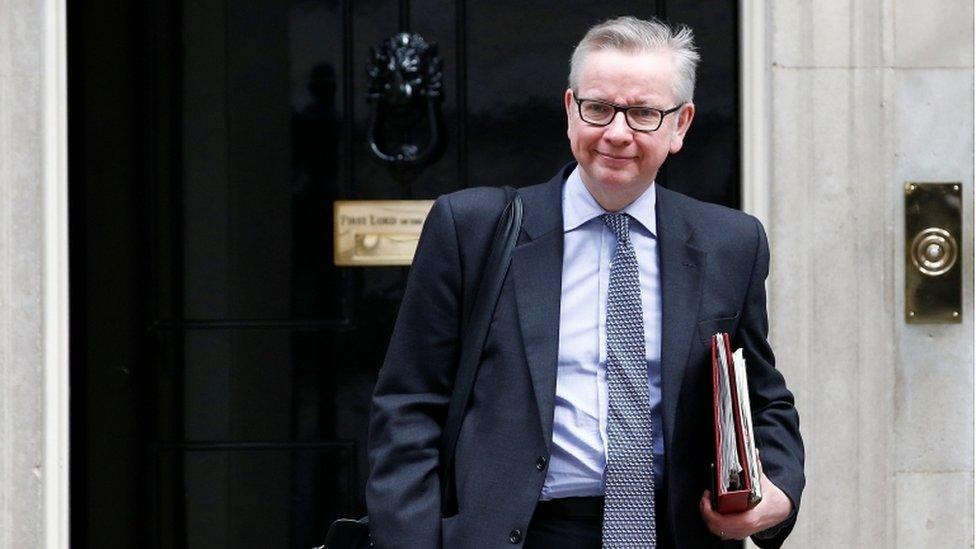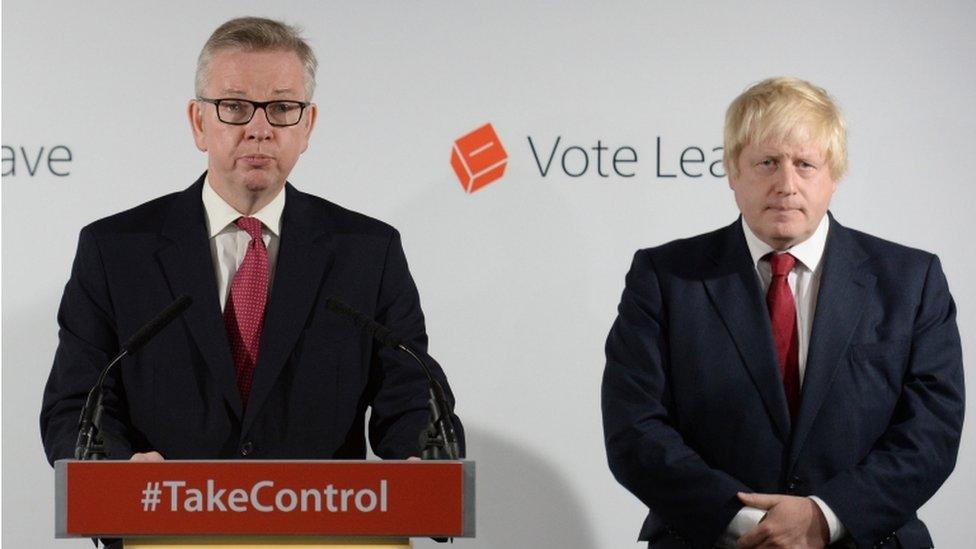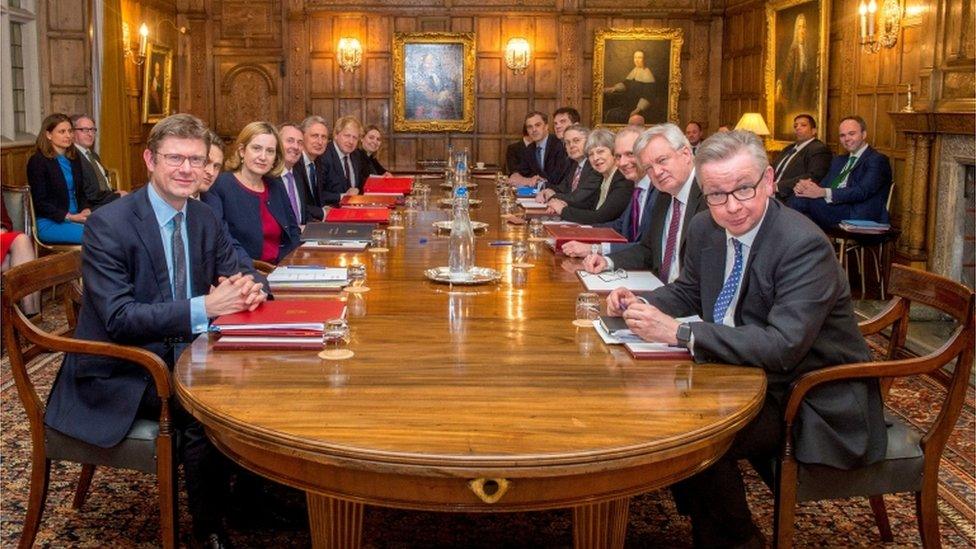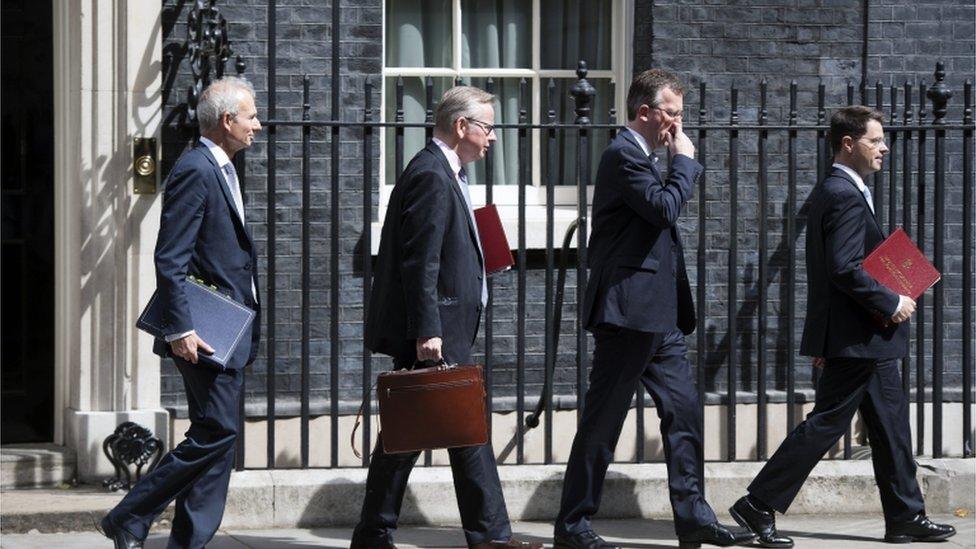Is Michael Gove the most effective government minister?
- Published

Michael Gove returned to government as environment secretary in June 2017, nearly a year after being sacked as justice secretary
Michael Gove. Just the mention of his name on comedy shows elicits guffaws and groans.
He's become a figure of hate among teachers, parents and children, and a figure of fun among voters as a whole.
Yet talk to people in and around Westminster and a completely different man emerges. Whether they agree or disagree with his policies, they are united in their judgement: Gove has been the most effective minister of recent years.
Most ministers, when they finally reach office, are surprised to find that when they pull on the levers of power very little happens. Gove seems to have learned how to fix the cogs and pulleys so that a tug at one end produces a tangible result at the other.

Mr Gove clashed with teaching unions during his time as education secretary
Even his die-hard opponents can't deny that he has been effective. Mary Bousted is joint general secretary of the National Education Union, representing teachers. During his education reforms, she was one of Gove's greatest adversaries.
"Within 77 days of the 2010 general election he'd got the Education Reform Act through Parliament," she says.
"The pace of change which he promoted was extraordinary. The problem with that, of course, is there are unforeseen and unintended consequences and casualties all over the place, which in recent years have very much tarnished his reforming reputation."
That's something you hear about Gove's education reforms from some critics. Other people praise the way he's introduced more rigour into exams and given schools more freedom.
But the BBC Radio 4 programme I've made, Gove in Government, isn't about whether his policies are right or wrong. And nor is it about his views on Brexit, his fallout with Boris Johnson, or his blundering bid for the Tory leadership. It is about Gove, the departmental minister.

Mr Gove and Boris Johnson fronted the Vote Leave campaign during the 2016 EU referendum
So how has he managed to be so effective, in three different government departments?
Camilla Cavendish was head of the policy unit at No 10 when he was Lord Chancellor, running the Ministry of Justice. She told me: "He had a laser-like focus about what he wanted to achieve and he was bloody minded about getting there.
"What I've observed from being in government is that unless you have those things as a cabinet minister, it's incredibly difficult to get anything done."
As well as a focus, though, Gove realised that he had to attract the right people into his private office: the junior to middle-ranking officials whose job it is to chase progress, demand improvements and often tell more senior civil servants that their work isn't good enough.
This requires a degree of character and courage. Pamela Dow, his principal private secretary at Education who followed him to Justice, says it's inspiring to work for a minister who knows his mind and wants to change things.

Mr Gove rejoined the cabinet as environment secretary
"The fast-streamers would not normally have been excited to work at Defra, whereas now people really are, because it's nice to see the policy you're working on being talked about. Whether you're a supporter or not, no-one can deny that in every department he's gone to, he's had a radical vision, made waves about it and made a tangible difference."
Defra, of course, is the Department of the Environment, Food and Rural Affairs, usually rather a backwater in government. But Gove has transformed it. Outside Brexit, the main policy everyone's been talking about in the past few months has been how to reduce the amount of plastic we use. And that is an initiative Gove has been championing, after the scale of the problem was highlighted by TV series Blue Planet II.
He likes to see himself as a revolutionary. On the walls of his office are posters of Lenin, Martin Luther King and Malcolm X - not the natural heroes of a Conservative politician. Early on in his ministerial career, he was perhaps too keen to make enemies of the establishment - which is why teachers took against him. In his later years, he has learnt his lesson and become more emollient.
People who work with him find him charming and unfailingly polite. He's been known to disappear to a bookshop and return with a carefully chosen book for each member of his private office. Even his enemies, though, are disarmed by his courtesy. Mary Bousted was astonished when he gave her a bottle of gin recently as a wedding present.

Gove's leadership bid bombed but he has impressed many as a minister
Sir David Bell was Gove's first permanent secretary in the Department for Education, and wasn't a natural ideological ally. But he too has a respect for the man.
"Michael has a legendary politeness. He was very good with officials, he was open, he listened. He had a voracious appetite for reading and he was completely engaged with the agenda.
"That was something that impressed officials. Here was somebody who was absolutely on top of the brief and who was prepared to put the hours in. Michael was clearly up to it intellectually, and he worked enormously hard to drive his agenda."
His four-year run as education secretary came to an end in David Cameron's July 2014 reshuffle, when Mr Cameron was advised by his strategist Lynton Crosby to "get the barnacles off the boat" ahead of a general election.
It was suggested at the time, external that Gove was seen as "the king of the barnacles" because he was so toxic with teachers.
A lot of people hate Michael Gove for what he did in schools, for his support for Brexit, for the way he knifed Boris Johnson in the back.
His bid for the party leadership was a disaster. So Gove the politician may not have been a great success. But I've been really struck, in making this programme, by the number of people who've worked with him and against him who have the same view of Gove the minister.
Nearly 40 years ago, the Labour politician Gerald Kaufman wrote a book that's still in print, called How to be a Minister.
Whatever the recent speculation, I think it's highly unlikely that Gove will end up at No 10. He's too unpopular with voters.
But perhaps next time he gets sacked, he should spend his time out writing a sequel. It might become a bible for the next generation of aspiring ministers.
Mary Ann Sieghart is a writer and broadcaster. She worked alongside Michael Gove when he was a columnist for The Times newspaper.
Gove in Government, on BBC Radio 4, runs on Sunday 24 June and will be available to listen to online after the broadcast.